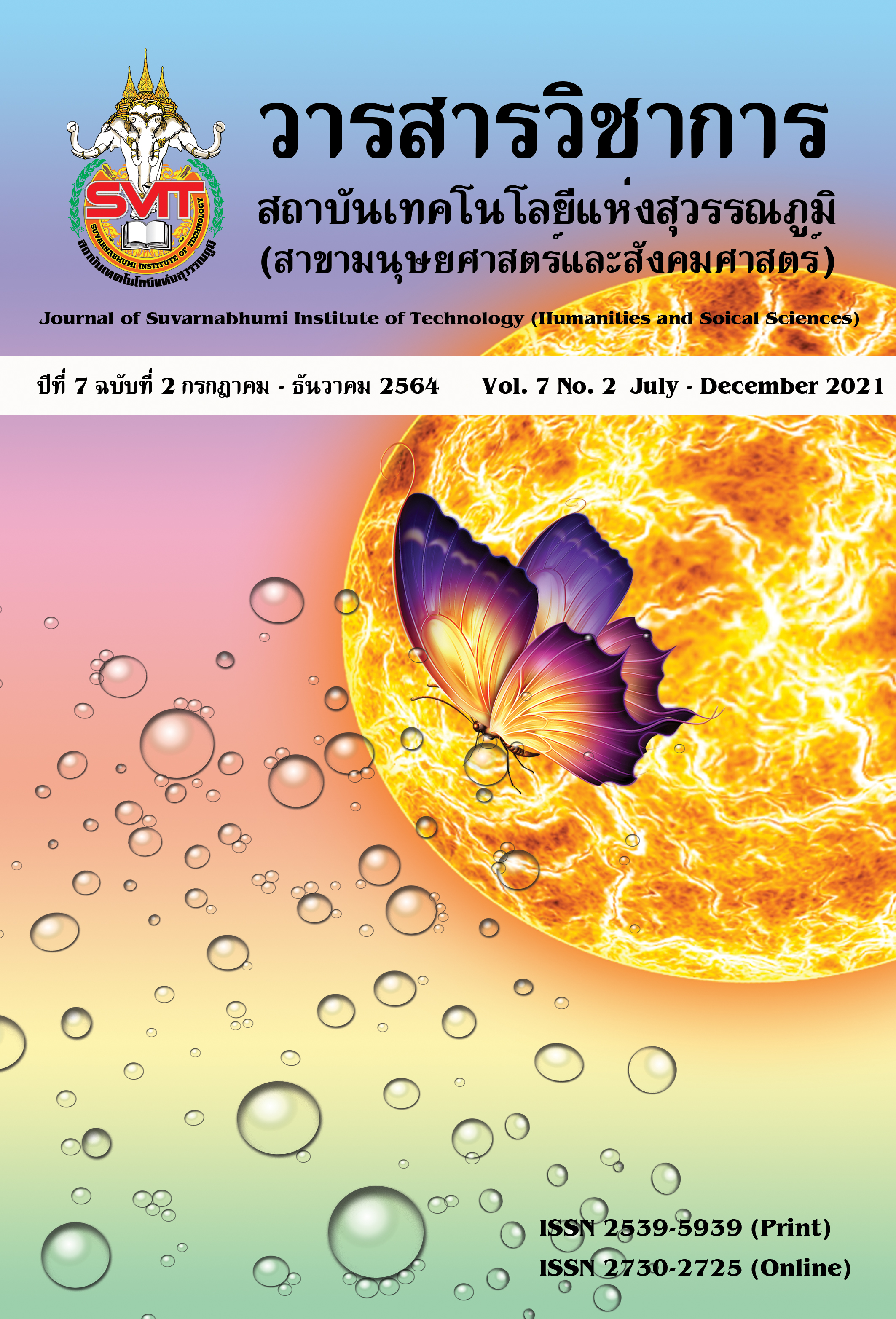TOURISM MANAGEMENT ACCORDING TO COMMUNITY GOOD GOVERNANCE IN CHANTHABURI PROVINCE
Keywords:
good governance, community tourism management, tourism management according to community good governanceAbstract
The study of Tourism Management according to Community Good Governance in Chanthaburi Province is qualitative research. The objectives of this study were to study 1) tourism management conditions according to community good governance in Chanthaburi province 2) support and obstacle factors in tourism management according to community good governance in Chanthaburi province and 3) appropriate model of community tourism management according to good governance. There were 3 communities in this study included; 1) Chanthaboon Waterfront 2) Tapon Community and 3) Rak Khao Bai Sri Community. The data was collected by qualitative method included; 1) focus group and 2) in-depth interview, and data analyzed by typological analysis, comparative analysis, and model of tourism management according to community good governance was clarified attribute evidence with professional or expert to good quality to use in actual operation.
The result revealed that; tourism management conditions according to community good governance in Chanthaboon waterfront has managed community tourism as naturally; there are 3 indicators are not clear including; 1) rule of law 2) ethics and 3) transparency. In addition, Tapon and Rak Khao Bai Sri Community have managed community tourism all of 6 indicators including; rule of law, ethics, transparency, participation, accountability and cost – effectiveness or economy. Moreover, the important supporting factors of tourism management according to community good governance in Chanthaburi province are government and private agencies, government policies that promote tourism, cooperation of community members, and community leader and public relations media. Whereas, the obstacle factors of tourism management according to community good governance in Chanthaburi province are community utilities, lack of planning for long-term tourism management, lack of strength and motivation to attract tourist, and the main occupation of members. Furthermore, the appropriate model of community tourism management according to good governance is community should manage community tourism all of 6 indicators for effective and successful tourism management and resulting in economic and social development of community.
References
ระเบียบสำนักนายกรัฐมนตรีว่าด้วยการสร้างระบบบริหารกิจการบ้านเมืองและสังคมที่ดี. (2542, 10 สิงหาคม). ราชกิจจานุเบกษา. เล่ม 116 (ตอนที่ 63 ง), หน้า 24-31.
รัชนีวรรณ บุญอนนท์. (2557). รูปแบบการบริหารจัดการการท่องเที่ยวอย่างเป็นธรรม กรณีศึกษา วัดวังพระธาตุ ตำบลไตรตรึงษ์ อำเภอเมือง จังหวัดกำแพงเพชร. วารสารสักทอง วารสารมนุษยศาสตร์และสังคมศาสตร์ มหาวิทยาลัยราชภัฏกำแพงเพชร, 20(3), 43-57.
วรรณวีร์ บุญคุ้ม, และคณะ. (2558). การพัฒนารูปแบบการจัดการการท่องเที่ยวเชิงวัฒนธรรมที่มุ่งเน้นการเสริมสร้างอัตลักษณ์และการพัฒนาอย่างยั่งยืนในจังหวัดสุพรรณบุรี. มหาวิทยาลัยศิลปากร. DOI: https://doi.nrct.go.th/ListDoi/listDetail?Resolve_DOI=10.14457/SU.the. 2015.2
วิราสิริริ์ วสีวีรสิว์ และคณะ. (2558). ความเป็นไปได้และรูปแบบการจัดการการท่องเที่ยวเชิงสุขภาพในเขตอำเภอท่าม่วง จังหวัดกาญจนบุรี. วารสารวิชาการมหาวิทยาลัยอีสเทิร์นเอเชีย ฉบับวิทยาศาสตร์และเทคโนโลยี, 9(2), 210-218.
สำนักงานปลัดกระทรวงการท่องเที่ยวและกีฬา. (2559). แผนพัฒนาการท่องเที่ยว ฉบับที่ 2 (พ.ศ. 2560-2564). สืบคืนเมื่อ 25 สิงหาคม 2561, จาก https://secretary.mots.go.th/ewtadmin/ewt/policy/download/article/article_20170509151402.pdf
อาภาภรณ์ สุขหอม. (2560). การจัดการการท่องเที่ยวแบบมีส่วนร่วมของชุมชนบางน้ำผึ้ง อำเภอพระประแดง จังหวัดสมุทรปราการ. การประชุมวิชาการระดับชาติ “วลัยลักษณ์วิจัย” ครั้งที่ 9. วันที่ 30-31 มีนาคม 2560, ณ อาคารปฏิบัติการเทคโนโลยีและพัฒนานวัตกรรม มหาวิทยาลัยวลัยลักษณ์. กรุงเทพ: มหาวิทยาลัยวลัยลักษณ์.
World Tourism Organization and Griffith University. (2017). Managing growth and sustainable tourism governance in Asia and the Pacific. Madrid: UNWTO.
Downloads
Published
Issue
Section
License
The articles published are copyrighted by the Sarasas Journal of Humanities and Social Science. The opinions expressed in each article in this academic journal are those of the individual authors and do not reflect the views of Sarasas Suvarnabhumi Institute of Technology. The authors are solely responsible for all aspects of their respective articles. Any errors or inaccuracies in the articles are the sole responsibility of the authors.



